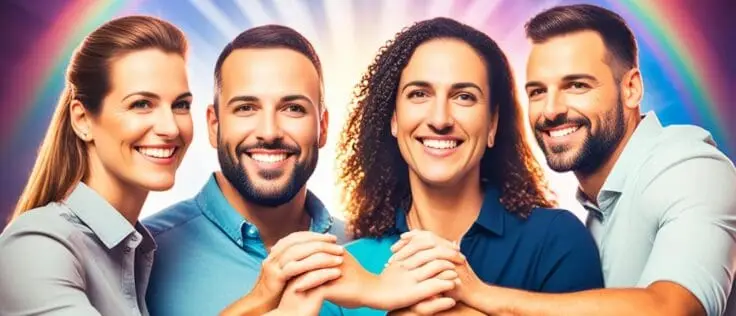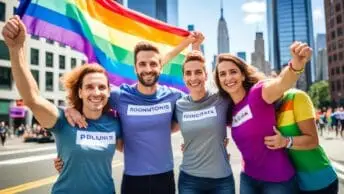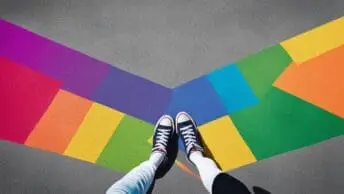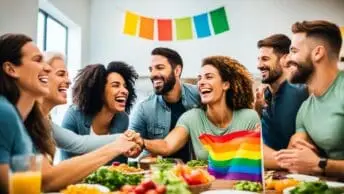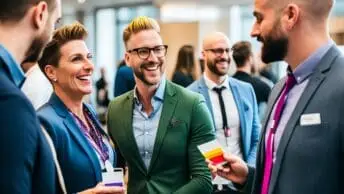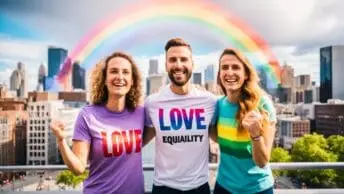Have you ever thought about what it takes to change society and get rights for everyone? No matter who they love or how they identify? Advocacy is really powerful, especially in the LGBTQ+ community’s efforts.
LGBTQ+ activism is key to fighting prejudice and making policies better. It helps create a more welcoming world for everyone. The European Region of the International Lesbian, Gay, Bisexual, Trans & Intersex Association (ILGA) in Brussels is at the heart of many campaigns. They launched “Make It Work: Six steps to effective LGBT human rights advocacy” in October 2010 by Aengus Carroll, with Beth Fernandez editing.
This guide is packed with advice on leading successful advocacy. It shows how to use human rights rules to support your cause and reach your goals.
Even when it’s tough, LGBTQ+ advocates keep speaking up for change. Their tireless work is leading to real improvements in LGBTQ+ rights. They’re helping to build a future where everyone is accepted, and equality is the norm.
The Role of Advocacy in Social Transformation
Advocacy is key to changing society. It has greatly helped the LGBTQ+ community fight against unfairness and for their rights.
Its goal is to lift up groups that society often overlooks and fix deep-rooted inequalities. Social advocacy has made a big difference for the LGBTQ+ community. It changes laws and policies, making sure everyone’s rights are respected.
Social workers are at the heart of this. They join forces with NGOs to make a big difference. They stand up for human rights, especially for the LGBTQ+ community. This makes society better and more just.
Furthermore, advocacy teaches people about social issues. It helps everyone understand the problems some groups face. Social workers engage the community. They encourage people to help solve these problems and make society welcome everyone.
Efforts like ‘MeToo’ and ‘Black Lives Matter’ show the power of activism. These move us closer to equality and change society for the better. Despite obstacles, advocacy drives us towards fair solutions for everyone.
For the LGBTQ+ community, advocacy is crucial. It raises awareness and fights for rights. Advocates work hard to end discrimination. They are leading us to a future that’s fair and accepting for all.
LGBTQ+ Activism in the UK: A Historical Perspective
The growth of LGBTQ+ activism in the UK has been incredible. In 1701, Charles Worrell was tried for sodomy, showing early persecution. Later, Oscar Wilde was infamously labelled a ‘posing sodomite’ in 1895. Despite these challenges, signs of resistance emerged. Anne Lister’s will in 1841 left everything to her partner, Ann Walker. This was a brave act of love against the odds.
The Wolfenden Report in 1954 was a turning point. It suggested making homosexual acts legal. It took time, but it started important changes. By 2000, the age of consent was the same for everyone. This was a big win for fairness and equality.
In 2004, the UK introduced civil partnerships for same-sex couples. Then, same-sex marriage became legal in England and Wales in 2014, Scotland the same year, and Northern Ireland in 2020. These steps showed the huge efforts of activists for equal rights.
Pride events have also been vital. London Pride is known worldwide. It, along with other Pride events across the UK, celebrates the LGBTQ+ community. They show unity, visibility, and the joy of being oneself.
Many people and events have shaped LGBTQ+ activism. For example, the portrait of Patrick Nelson by Duncan Grant made an impact. So did the ‘Die-in’ protest at Trafalgar Square in 1993. These actions helped change how people see the LGBTQ+ community. Stories like April Ashley’s in 1962 shared personal challenges and triumphs.
To sum up, LGBTQ+ activism in the UK has led to great progress. Persistent efforts have brought about legal changes and wider acceptance. Today, the movement’s achievements inspire the ongoing fight for equality.
The Importance of Visibility and Representation
Visibility and representation are vital for the acceptance of LGBTQ+ folks in society. By including LGBTQ+ individuals in media, politics, and work, we shift society toward acceptance and empowerment. This change helps everyone feel valued and supported.
For instance, in the legal field, a groundbreaking moment occurred in 2023. Out of 283 candidates for Silk, 14 were openly LGBT+, and seven achieved the prestigious title. This milestone shows increasing LGBTQ+ visibility. It celebrates diversity in a space that was once very conservative.

However, some organisations stick to shallow diversity efforts that don’t change much. True change goes beyond just numbers. Instead, sponsorship programmes are better as they actively fight bias. They open up real chances for people to succeed.
An inclusive world lets LGBTQ+ people focus on their skills, not fighting prejudice. Having clear policies for equality and inclusion helps. It encourages LGBTQ+ folk to be themselves boldly and proudly. This is vital in every professional environment.
Seeing more LGBTQ+ people in all walks of life helps break down old stereotypes. While personal stories might not sway politics much, they’re powerful for creating a welcoming culture. When someone can be open about their sexuality and be celebrated, it sets a positive example. This inspires the younger generation to become leaders and advocates too.
Challenges Faced by LGBTQ+ Advocates
In various places around the world, LGBTQ+ advocates face tough challenges. One big problem is societal discrimination, especially in parts of Africa. Here, social stigma can lead to violence and hate crimes against LGBTQ+ people. Some African countries have laws that punish same-sex relationships very harshly, even with death.
However, there are signs of progress in some regions. For example, Botswana and Namibia have improved LGBTQ+ rights significantly. Namibia’s Supreme Court recognized same-sex marriages from other countries. Angola removed laws punishing same-sex activities. These changes show progress despite ongoing challenges.
Yet, LGBTQ+ discrimination is still widespread. Groups like UHAI and ILGA-Europe show incredible determination. UHAI, the first activist-led fund in Africa for LGBT+ people, offers grants and support. ILGA-Europe connects over 700 LGBT+ groups across Europe and Central Asia. Their efforts highlight strong resilience against discrimination.
LGBTQ+ advocates have also made big wins in law. For instance, Moldova made important changes for LGBTQ+ rights in 2022. Legal reforms in Finland, Spain, and Scotland have made it easier for people to legally recognize their gender.
But 2022 was a very violent year for LGBTQ+ people in Europe and Central Asia. The dangers they face are still very real. The issue of intersectional discrimination makes these challenges even more complex.
About 1.7% of children are born with diverse sex characteristics, challenging simple male/female categories. Advocates stress the need to protect intersex individuals from unwanted surgeries. These surgeries can hurt their physical and mental health.
Transgender people face barriers in getting legal recognition and acceptance. The process to confirm gender identity is often long, impersonal, and expensive. The COVID-19 pandemic has made their situation worse, highlighting the need for important changes.
Although the journey for LGBTQ+ advocacy is filled with obstacles, activists keep pushing for a fairer future. Their collective and individual efforts inspire hope in the fight against LGBTQ+ discrimination. They are working towards a world that is more welcoming and fair for everyone.
The Intersection of LGBTQ+ Advocacy and Legal Frameworks
Legal advocacy plays a key role in advancing LGBTQ+ rights. It helps shape policy and boost human rights laws. The decriminalisation of same-sex activities in countries like India and Botswana shows progress. This change highlights how advocacy efforts can lead to more liberal laws.
In some areas, including Peru and parts of the Philippines, laws now cover sexual orientation and gender identity. Activists pushed for these laws to protect LGBTQ+ people from hate crimes. Such legal changes aim to make communities safer for everyone.
Yet, not all places are safe for LGBTQ+ individuals. In Azerbaijan, Egypt, and Indonesia, violence against LGBTQ+ people can be common. This happens even where there are no laws against LGBTI identities. It shows the urgent need for protective laws.
The UNHCR report in 2015 revealed gaps in protection for LGBTI asylum seekers. Laws in some places directly target them unfairly. This includes laws on sexual crimes and issues accessing legal support. Legal persecution is still a harsh reality for many.
Even with legal protections, LGBTI survivors of violence might struggle to get justice. They often fear backlash from the authorities. The law should protect, not discriminate. This shows why smart legal advocacy is key to helping asylum seekers.
The fight for LGBTQ+ rights isn’t just about making laws. It’s also about ensuring these laws work in practice. Activists work hard to shield the community from harm and discrimination. Their efforts help build a more inclusive world for all.
Community Building and Allyship
Creating a unified LGBTQ+ community is vital for advancing support and advocacy. By fostering LGBTQ+ community support, we not only help those within the community. We also build strong allyship, making a more inclusive culture for everyone.

Allyship is key to making diverse and inclusive spaces, especially at work. Allies help by listening to those who are often ignored, joining groups that support diversity, and using language that includes everyone. This kind of active support can make workplaces better and safer for everyone.
Being an ally is different from being an advocate. Advocacy aims to change unfair practices and policies. Allyship focuses on supporting people directly. Both are important for making communities where everyone is valued and respected.
Some might worry about the negative feedback from supporting these causes. But, companies can lessen these fears. They can do this by promoting inclusive actions and showing strong leadership. A supportive work culture can encourage more people to become allies or advocates.
Having a growth mindset also helps allyship efforts. Recognising mistakes as learning opportunities encourages people to become allies. When companies support allyship and advocacy, they see many benefits. They become places where diverse talent thrives, innovation blooms, and staff turnover is low because everyone feels valued.
Supporting ERGs and giving a voice to marginalised staff helps build stronger communities. Setting clear allyship goals and holding people responsible for meeting them is crucial. These steps help ensure everyone works towards diversity, equity, and inclusion.
In conclusion, allyship and community building work together to make awareness efforts more effective. They help achieve greater acceptance and understanding. By supporting each other and welcoming allies, the LGBTQ+ community can create a better world for everyone.
The Power of Individual Stories
Personal tales have a great power to make LGBTQ+ rights more relatable. By telling their stories, people can break down stereotypes and build understanding. This way, personal accounts shine a light on the LGBTQ+ experience, touching hearts and changing minds.
Alarmingly, 79% of LGBTQ+ workers have faced either discrimination or harassment at their jobs. Additionally, 37% of LGBTQ+ adults say they’ve been treated unfairly at work. These facts highlight why sharing personal stories is crucial. They can shift perceptions and foster acceptance.
Transgender people deal with unique struggles. For instance, 23% have been discriminated against when applying for jobs, and 72% have suffered mistreatment in the workplace. Publicizing these experiences raises awareness and promotes empathy. Moreover, 29% of LGBTQ+ workers have hidden their personal lives to avoid bias. Highlighting these realities can drive positive change.
Emotional and relatable stories have a big impact. They move policymakers and communities alike, encouraging progress. Keeping up the conversation and leading with empathy are essential. Indeed, the influence of sharing personal stories in advocating for LGBTQ+ rights is immense.
Harnessing Digital Platforms for Advocacy
Today, digital advocacy is essential for social change. LGBTQ+ activists use the internet to raise awareness. They build virtual communities and fight for equal rights worldwide.
Social media is key in this effort. Instagram and Pinterest share impactful, visual content. This content promotes inclusive lifestyles. Posting regularly improves visibility and representation for the LGBTQ+ community.
Videos are effective for sharing personal stories. They show the real lives of LGBTQ+ individuals. This encourages empathy and support for equality. Partnering with eco-friendly brands can also help. It makes campaigns more visible and stresses sustainable living.
Measuring success in online activism involves engaging with your audience. Tracking message reach and interactions shows if your efforts work. Adjusting strategies based on follower feedback is crucial.
SEO is vital for making advocacy content visible. It helps advocacy messages appear in search results. This attracts viewers and boosts credibility. Creating targeted content turns digital platforms into powerful tools for change.
Advocacy in Action: Methods and Techniques
Advocacy strategies are varied, each suited to the specific needs of the LGBTQ+ community. Self-advocacy helps individuals fight for their own causes. This mirrors the efforts of students with disabilities seeking better support.
People also get support from family, friends, and groups like charities and government bodies. There’s a bigger picture effort called systems advocacy. It works to change laws and policies for the better.
Groups work together in systems advocacy. For example, Amnesty International runs the “Write for Rights” campaign. This uses letters and petitions to help causes. Using media reports, like those from Human Rights Watch, boosts their efforts.
Healthcare advocacy is crucial, aiding people through complex systems and legal matters. Likewise, legal advocacy defends rights and offers representation. Victim advocacy is also key, providing emotional support and crisis help.
Actions like peaceful protests and town hall meetings have sparked huge changes. They were essential in the Civil Rights Movement. Success in campaigns also depends on being clear, flexible, and transparent.
The “Advocacy in Action” curriculum shows structured advocacy training. It includes worksheets, lessons for different levels, and projects that enhance learning. It’s now digital, helping deaf or hard of hearing students learn to advocate for themselves.
To really make a difference in LGBTQ+ rights, advocacy must be focused and strategic. Achieving change requires commitment, careful planning, and active engagement in the community.
Conclusion
The journey of LGBTQ+ advocacy is one of true determination and strength. Achievements in this field boost advocates’ energy and passion. This increases social acceptance and makes communities more inclusive. Social workers are key in this process. They help teach the public, create a sense of belonging, and connect people with important resources. Their work promotes a world where more people take part in making big changes for justice.
Looking ahead, we see both victories and hurdles. Social work and advocacy must join forces with NGOs to make a difference. This teamwork is crucial for changing laws and fixing deep-rooted unfairness. Unity in advocacy means we can tackle issues at every level. This helps break down barriers and improves people’s lives.
In conclusion, defending LGBTQ+ rights is an ongoing battle needing constant dedication. Advancing equality is not just about laws. It’s about crafting a world where everyone feels seen and valued. Through relentless advocacy, sharing personal tales, and using online platforms, the quest for a fair and inclusive society grows stronger. It promises a future where the LGBTQ+ community thrives.
